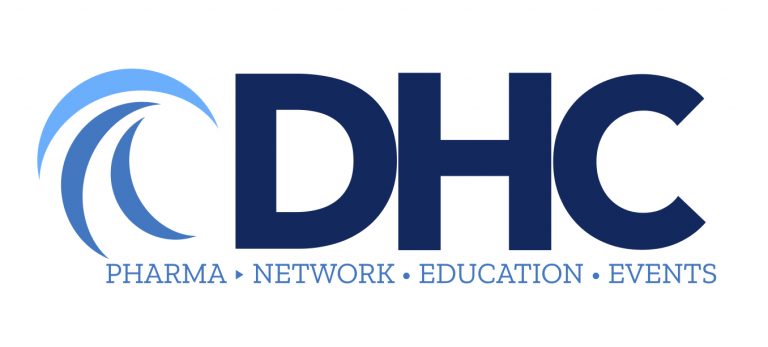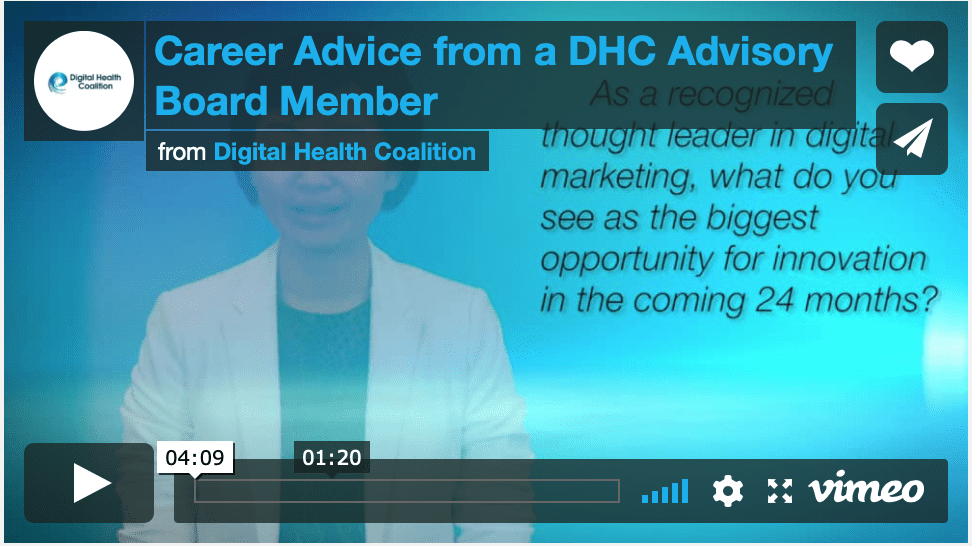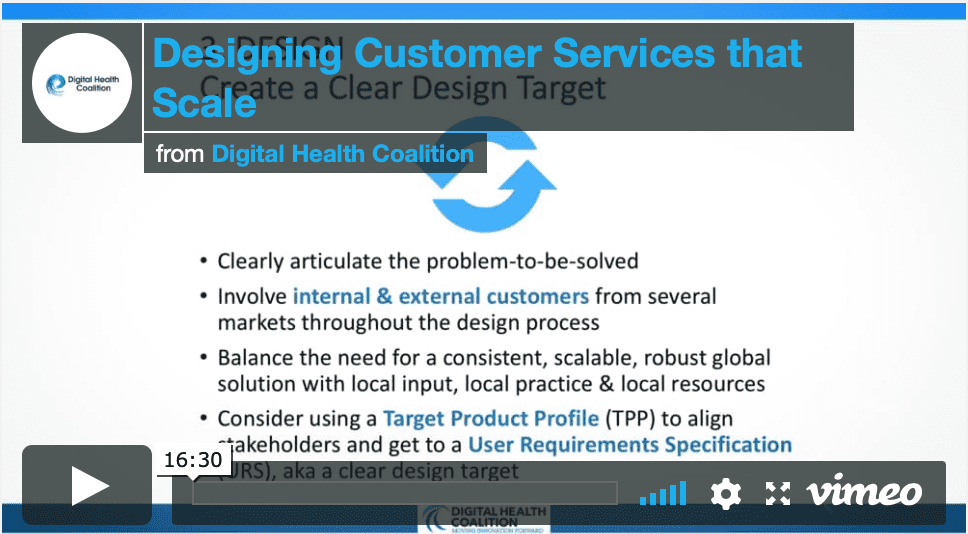Digital Health Coalition Newsletter - July 2019

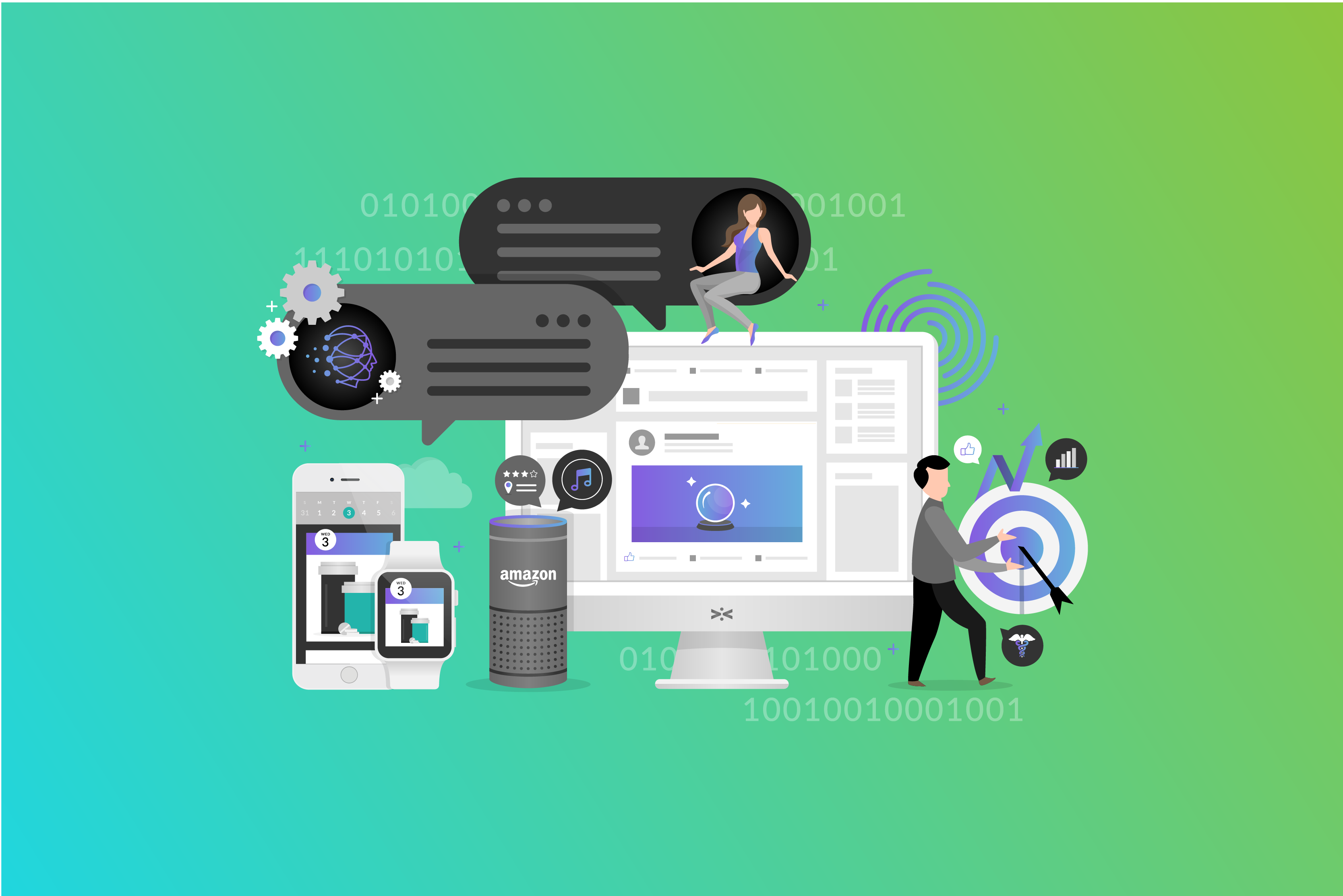
FEATURED CONTENT: AI & Modern Pharma Marketing - Changing the Game Now
The digital revolution has led to a data tsunami, with 90% of all data created in the past two years – empowering artificial intelligence that was once the realm of science fiction. From sports to banking, AI is changing the game everywhere. Perhaps nowhere is that potential as great as in healthcare, and in pharma marketing in particular. Our research, products, teams, plans, strategies, tactics, and results will all be affected by AI, as it becomes an intrinsic and vital part of doing business.
Traits of AI That Make it Especially Valuable for Heathcare

Efficiency at scale
Humans can’t work efficiently with data sets that are too large.

Accuracy
AI removes the opportunity for human error caused by factors like bias, prejudice, emotion or exhaustion.

Enhanced Utility
Bringing sci-fi into reality, AI enables complex digital functions that were impossible for either humans or machines.

Speed
Thanks to ever-increasing storage and processing capabilities, AI can provide analysis, answers, and even predictions that can affect decisions in real time.

Flexibility
Conventional computing requires very precise inputs, but AI programs can be fed structured or unstructured data.
For the above reasons, and many more, AI is becoming a technology that will change our lives – and our work – in innumerable ways. Because of its importance, the DHC and Intouch Group collaborated to write the multimedia ebook, Modern Marketing: Pharma’s Data-Powered AI Revolution. First published last year, we’re revisiting the topics we covered there to stay up-to-the-moment with the latest trends and thinking.
Section 2: Where AI Innovation Has Been Realized in the Last Year
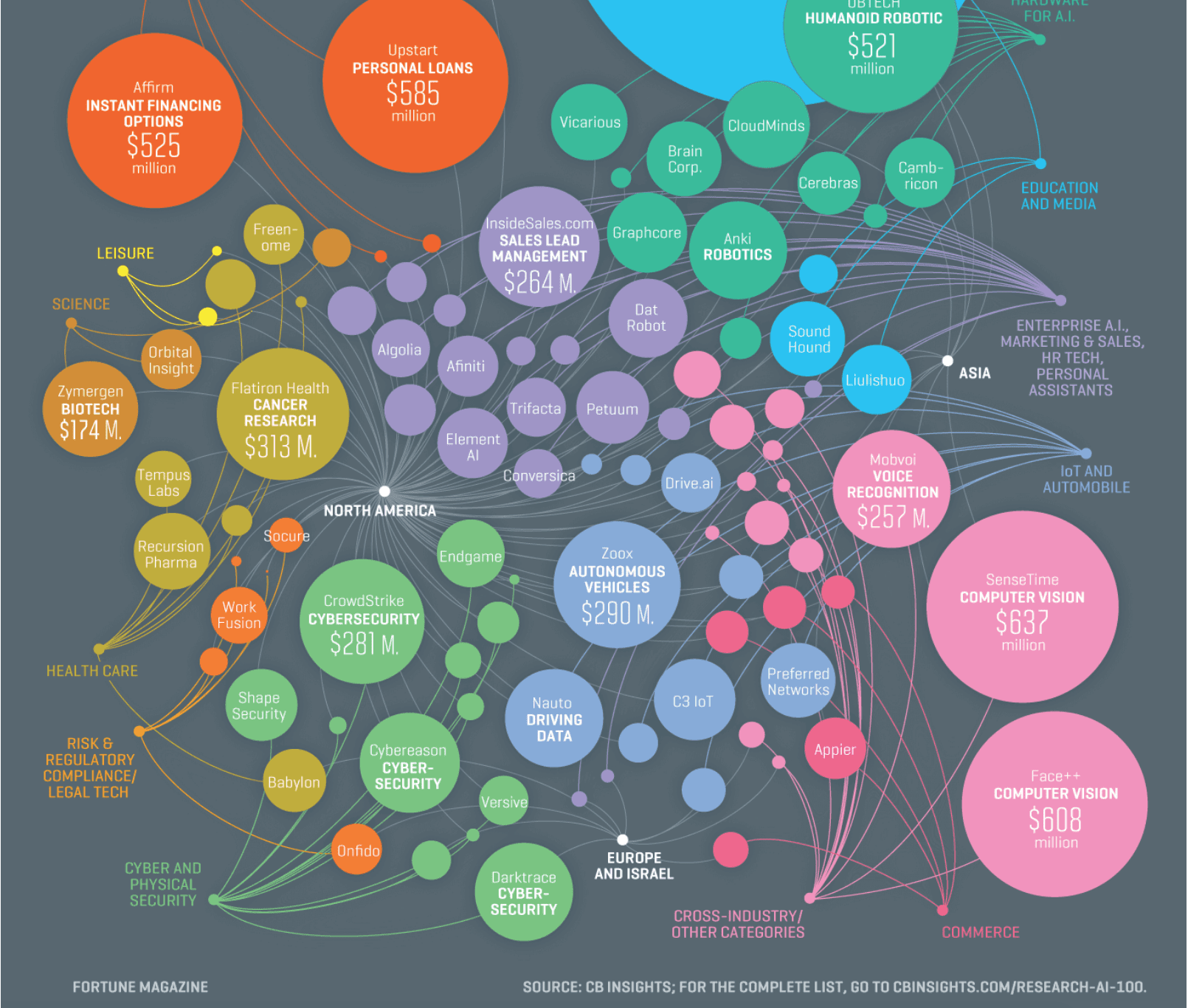
DRUG DISCOVERY
Glaxo has made headlines lately by continuing to build its R&D leadership team with AI experts. However, tech companies continue to keep the competitive pressure on, as advances continue to push the envelope. Google’s DeepMind AI recently demonstrated that it could beat more than 50 labs at predicting the shapes of proteins – an immensely complex endeavor that might be a precursor to predicting effective new drugs.
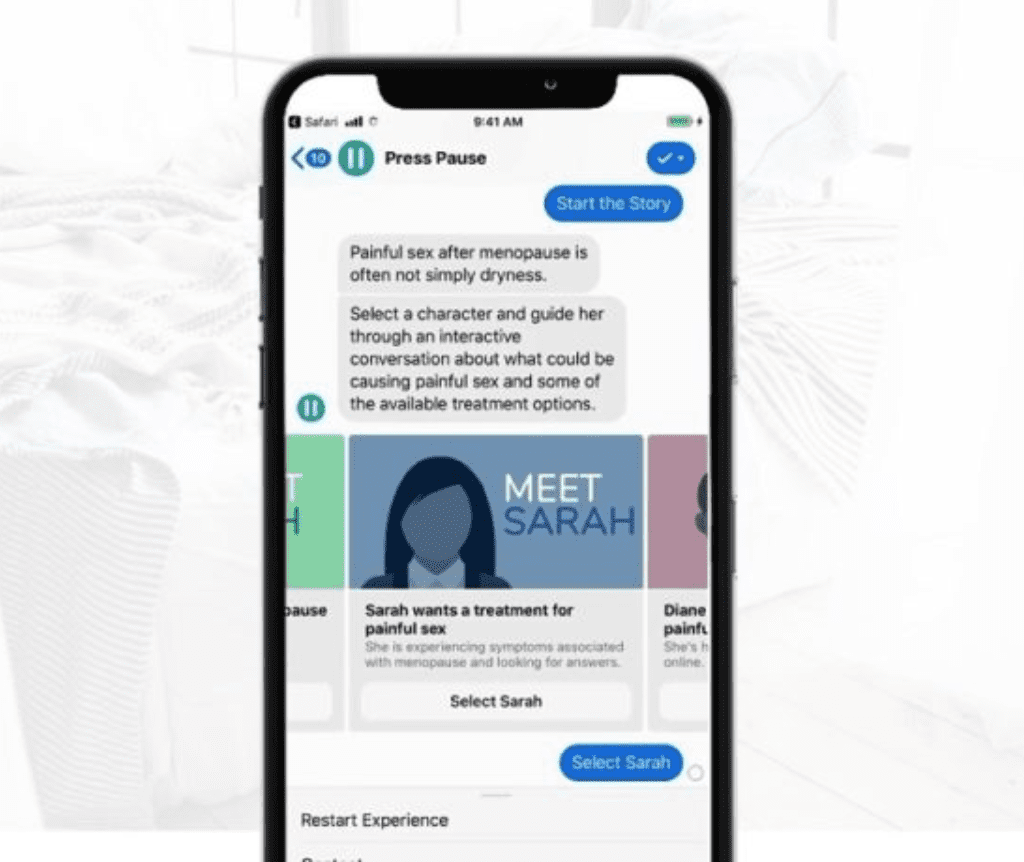
CHATBOTS
In Chapter 5 of the Modern Marketing ebook, one prediction for the future of AI in healthcare centered on the concept that AI would drive improved “efficiency, personalization, understanding and engagement”. Chatbots were just one example. At the DHC Northeast Summit in May of this year, innovative marketers from AMAG Pharma discussed their use of a chatbot for the brand Intarosa.
While the ebook correctly identified that chatbots are already a part of our landscape, its prediction might have been too conservative. We estimated that next-gen versions of chatbots would “strengthen in number and in power over the next five years, and will be joined by others that stand on their shoulders to go even further, particularly into coverage, reimbursement, and treatment decisions.” We’re pleased to see that the team at AMAG has already begun to realize that potential.
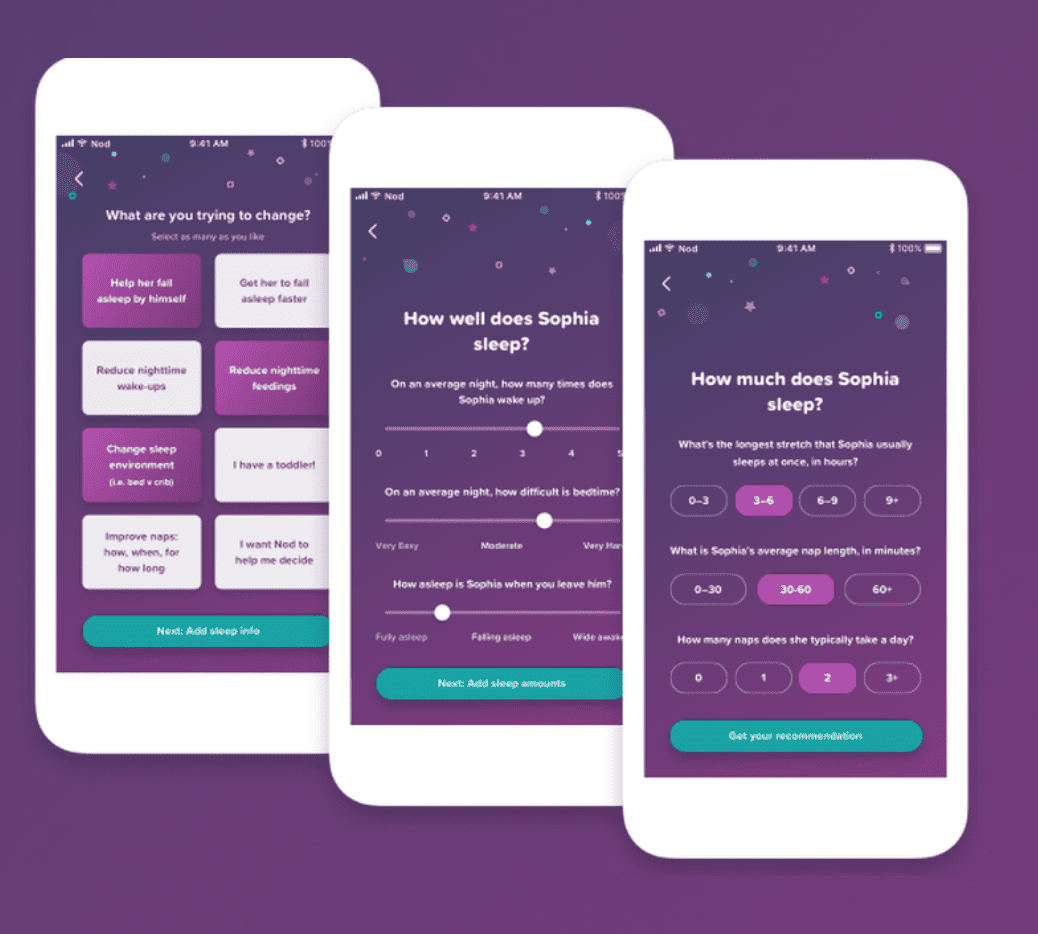
CAREGIVER SUPPORT
“It really is an AI-driven, digital baby sleep-coaching system, the first ever in the world to allow parents to help get their kids to sleep through the night. I would think what’s so exciting about this is the personalization factor around it, and that really brings together in its best form the know-how and the capabilities of Johnson & Johnson with the speed and agility of an early stage company…. That’s something that we continue to develop, and we see other opportunities with that same application of learning systems, personalization systems, and AI-driven recommendations that J&J can potentially show up in the market, delivering its knowledge and capabilities through that kind of application.”
You can see the platform in action at NodtoSleep.com.

VOICE
A recent study discovered that Google Assistant understands medication names better than Amazon’s Alexa or Apple’s Siri. In a landscape where voice-based mobile/personal device use is exploding, AI’s role is as well. According to coverage in a recent online journal, this study “suggests that voice assistants may have potential for generating health information, but patients and consumers should not rely on them as reliable sources of medical information and advice.
There is still substantial room for improvement in how effectively these AI systems provide health information. These studies have illustrated the relatively poor performance of voice assistants when attempting to generate health information from questions that may be trivial for a human healthcare practitioner to answer.” The ability of AI to move the needle in voice-based innovation is significant – and necessary, considering that 20% of all searches are currently done by voice.

“I believe over 400 vocal signatures are hiding out in your voice data. The voice data itself has its own vital signs in our JLAB’s Toronto incubator called WinterLight Labs. We are exploring with their technology and understanding how WinterLight’s voice-driven system and their biomarkers are able to early detect mild cognitive impairment when one might be on their way to Alzheimer’s disease. Be able to predict that early is a really interesting opportunity.
I think really looking at these low-friction or invisible technologies that really start to push behind the scenes and let people live their lives, but while that’s happening, start to think of what this new kind of ‘check engine light’ system that might be working on the back end to inform you early and alter that trajectory.”
~Cris De Luca, speaking again in the J&J Innovation podcast
Section 3: DHC Members and Industry Thought Leaders Weigh in on AI
We also heard first-hand from DHC members and industry thought leaders on the current state of AI. To ensure we are all starting with the same frame of reference, we are happy to provide here a link to the DHC & Intouch Solutions co-produced glossary of AI terms (re-published recently by PharmaPhorum.)

Sara Gerke...
“But a successful deployment of health AI also requires the trust of healthcare workers and patients. It is therefore essential to be transparent about the collection and use of data, as well as to have adequate data privacy laws in place that cover all personal data, including data concerning health.”

Abidur Rahman...
RPA can help humans eliminate errors, speed up manual processes, and lower costs. It typically builds upon existing data, integration with existing systems and APIs without the need to implement an entire AI ecosystem. For example, RPA can be used to efficiently tag content during SEO and content audits and allow marketers to focus on more valuable tasks like developing actionable insights from data. Brands can pair RPA with other AI applications like deep learning or natural language processing (NLP) to maximize value.”

Cris De Luca...
…Global Director of Digital Innovation, Johnson & Johnson Innovation, made these remarks about the AI landscape today in the above-mentioned recent podcast: “There’s this manifestation of new technologies that have hit the market, especially in the healthcare space, and I’m really pumped about seeing all of the venture capital and the innovation being injected into AI, in artificial intelligence.”
“You really have to think of the human-centric design aspect of this, and really understanding not just at an individual level, but you have to really look at all of the ecosystem of issues that are going on at the disease level and what that might mean from an empathetic perspective. When you start to see some of these things come together, there’s almost a new class of technology that I’m really excited about with AI being the ecosystem.”

Brendon Thomas...
“A new research report issued in July estimated that the global healthcare AI market will grow at a rate of 44% to reach $28 billion by 2025, and attributed that largely to the use of NLP in clinical documentation and claim submission. It’s estimated that HCPs spend nearly half of their workday in their EHR systems and only about a quarter of it with patients. When they can document information as easily as speaking, it will fundamentally change their lives, and patients’, too.”

Sundeep Bhan...
…CEO of Prognos on where pharma brands are leveraging AI capabilities:
“One is targeting and understanding where patients are earlier. Most of what’s done today is based on claims or pharmacy data. That’s after the fact. The transaction has already happened. But you can get signals earlier: when sales reps interact with doctors, or with digital marketing campaigns.
“The second example of the utility of AI is connecting real-world data with outcomes. In oncology, we’ve seen certain patients respond to certain treatment cocktails without understanding exactly why. Connecting data sets — diagnostics, genomics, biomarkers, EHR data, Rx data, claims data — can help us understand why certain outcomes happen, and get to the causation.”
Section 4: Case Study: Where AI in Pharma Might Be Headed Next
Just as the internet itself did, AI technology will become ever more intrinsic to our lives and our work. If you’re over 40, you’ll remember that, for a while, it seemed like everything started with the prefix “e-“. And then, eventually, it just became part of how the world worked. Similarly, AI’s involvement will be a gradual evolution, not an overnight revolution. Our industry is complex and highly regulated, and change takes time. That doesn’t mean there aren’t opportunities for implementing AI-related improvements right away, though. One particular area is in helping to triage medical information.
Medical information teams are an integral part of every pharmaceutical company’s operations, fielding questions about medications from healthcare professionals, scientists, patients, and company personnel. Upon receiving a query, researchers must parse the question. What exactly is being asked? What’s the most up-to-date, relevant answer available? Does the submission include a complaint or the report of an adverse event? Does the answer already exist, or must it be drafted, reviewed and approved? Proper protocol must be followed, and timeliness is vital.
It’s an incredibly important process, but it’s also repetitive, time-intensive, and costly. While MI teams use a variety of automated systems and processes to respond quickly with high-quality, accurate, balanced responses, it requires considerable human effort and cost. It’s an area crying out for help.
AI could help to triage medical information responses in a way that continues to remain compliant and maintains a human touch, but is far more cost-effective, keeping the experts doing the work they need to, and not the sorting and organization they don’t.
ADDITIONAL INSIGHTS FROM DHC PARTNERS

Spotlight on AI in Pharma Marketing
Via Via Intouch Solutions | Website →
For more on AI in pharma, you can read our ebook in full at modernpharmamarketing.com. You can also check out the Spotlight on AI in Pharma Marketing section at PharmaPhorum, for a series of articles on the same topics: what AI means for pharma, and what pharma marketers need to know now to remain successful.
Read More Here →

J&J Innovation Podcast with Cris De Luca
Via Johnson & Johnson Innovation | Website →
On the episode, "Can Artificial Intelligence Make Us More 'Human'?", Caroline Baratz talks with Cris De Luca, a digital health leader at Johnson & Johnson, about how things like wearables, artificial intelligence and voice-technology will eventually become "invisible" to us, but play a vital part in preventing, intercepting and curing disease.
Listen Here →

New Klick Research finds Google Understands Medication Names Better than Alexa or Siri
Via Nature Digital Medicine | Website →
Since voice assistants are becoming widely used to gather health information, it is critical to study how well these devices understand the pronunciation of various drug names to provide relevant and safe information to users. The current research investigates how well Alexa, Google Assistant, and Siri comprehend the generic and brand name medications of the top 50 most dispensed drugs in the United States.
Read More Here →

Artificial Intelligence & the Future of Psychiatry
Via SERMO | Website →
An estimated 400 million people worldwide suffer from mental health conditions, and AI-based technologies are being studied to fill gaps in diagnosis and care. However, there has been little research into the views of practicing psychiatrists around the impact of AI on mental health. SERMO has done new global research and is sharing the results.
Read More Here →
DHC EVENTS COMING SOON

DHC East Coast Summit
October 8, 2019
Hosted by AstraZeneca
Request a Seat Today →
Mark your calendar now!

DHC West Coast Summit
November 14, 2019
Hosted by Genentech
Request a Seat Today →
Mark your calendar now!
DHC PARTNERS IN THE NEWS
DHC CONTENT
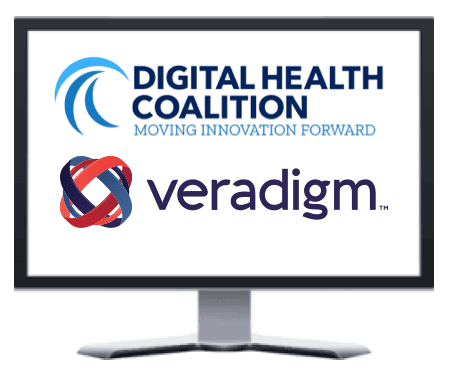
Just released on July 31, this informative webinar gives a first-hand look at the new environment of price transparency in the physician workflow. Medication Affordability continues to be one of the most prominent challenges facing healthcare today. Technologies delivering real-time, patient-specific prescription pricing to healthcare providers within their electronic health record or e-prescribing software have been available for more than a year, and adoption has been widespread. As a result, data has started to emerge on the impact of these technologies on patients, and providers, price transparency solutions have begun to evolve, and biopharma companies continue to seek ways to appropriately drive medication access and adherence in this new environment. Watch Now →

DHC and HCB Health partnered earlier this month on a webinar unveiling new research on physician attitudes and trends towards mobile healthcare. Attendees also heard more about the overall size and potential of the mobile health marketplace today and in next 5 years and several other key takeaways. The Webinar is now available on demand. Watch Now →

